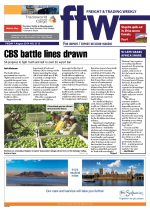Becoming a successful
exporter, distributor and
retailer in Africa did not
happen overnight for
Shoprite Checkers. It was the
result of a long-term strategy
and investment in which
many lessons were learned
and much patience was
required.
But despite the many
challenges – like labelling in
Portuguese for the Angolan
market, port congestion and
endless documentation for
customs and border crossings
– the company has firmly
established a foothold in the
continent.
“Going into Africa
requires perseverance
first and foremost,” said
a Shoprite spokesman. “It
is also not about making
profits quickly. Successful
operations require
investment and long-term
commitment to the countries
you are entering. You also
have to be keenly involved in
monitoring the market and
know when to expand.”
He said the decision
to export into Africa was
therefore more about
affordability than anything
else. “You have to know how
much pain you can afford
to take and for how long.
Formalised market research
does not really exist in many
countries and an educated
guess is called for. Yes, you
can send people to investigate
the market and you can
gather information, but you
never really know until you
try.”
He said understanding
that there was going to be
success and failure was
another important aspect to
remember.
Using South Africa as its
base, Shoprite Checkers has
been growing its African
operations over the past few
years, sourcing products both
locally and internationally.
“We invested in centralised
distribution centres that are
state of the art as we feel
this gives us a competitive
advantage and allows for a
more efficient supply chain,”
he said. “In Africa one is
reliant on road transport.
Transport in Africa is costly
and it is a factor one has to
take into account. Where we
can we use local transporters
within a country and we
ship to the closest port and
then move the goods by
road, while airfreight is used
as well – particularly for
perishable products that have
a short shelf life.”
For Shoprite it is about
making smart choices that
ultimately see the goods
moving more efficiently.
“There are challenges
in Africa that cannot be
underestimated. Export
compliance is a major
constraint, with each
country having its own set
of rules and regulations.
One has to be able to
accommodate the rules of
these countries efficiently
and effectively. We have
spent much time on this
as we believe being able to
do this well does create a
competitive advantage.”
Keeping up to date with
legislation is also important.
“For us success in Africa has
been a long and slow process
which included us taking
control of our own supply
chain. That is the only way we
could ultimately contain costs
to remain competitive.”
INSERT
Formalised market
research does not
really exist in many
countries and an
educated guess is
called for.
CAPTION
Shoprite Zambia... perseverance and long-term commitment have paid off.

